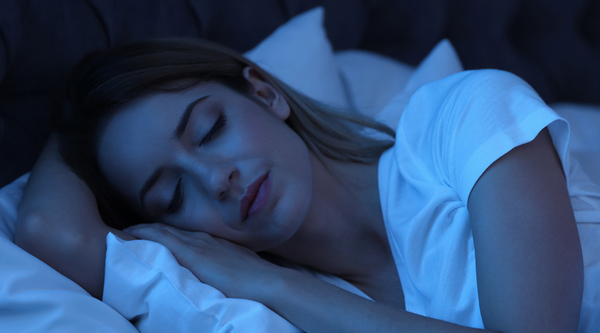Sleeping Beauty
Jul 16, 2024
Sleep has become the hot health and wellness topic in recent years, and with good reason. Renowned neuroscientist, sleep expert and author of the international bestseller Why We Sleep, Matthew Walker, calls it a non-negotiable biological necessity, our life support system, and the most powerful elixir of life.
Sleep is a complex interplay of brain activity, hormones and physiological processes that enables our minds and bodies to rest, recover and rejuvenate. It impacts everything from immune function to mood to how we age. In this article, we look at how sleep works, why it’s so important, the factors that negatively impact sleep quality, and what we can do to help us consistently get a good night’s sleep.
How Sleep Works
We experience two main types of sleep during a typical 90-minute sleep cycle, Non-Rapid Eye Movement (NREM) and Rapid Eye Movement (REM). During an optimal night of sleep, this cycle should repeat several times.
NREM has three separate stages: stage one is a light sleep as we move out of wakefulness; stage two is a deeper sleep that is characterised by our heart rate slowing and a drop in body temperature; and stage three is deep sleep, also known as Slow-Wave Sleep (SWS), which is critical for physical recovery and rejuvenation. REM comes after NREM and is a lighter phase of sleep; it’s when most of our dreaming happens and it’s essential for supporting cognitive functions such as memory, learning and mood regulation.
Our sleep-wake cycle is determined by our circadian rhythm, an internal process that is driven by a biological body clock, repeats roughly every 24 hours and determines when we feel awake and alert, and when we’re ready for sleep. The biological clock is in an area of the brain called the hypothalamus and responds to light signals from the eyes. People have different chronotypes, which means that their circadian rhythms may make them feel more alert or sleepy at different times of the day – this explains why some of us are ‘morning people’ and some are ‘night owls’.
The Impact of Sleep on Health
Consistently sleeping well – ideally between seven to nine hours a night for adults – has multiple health benefits. For physical health, deep sleep helps our bodies repair tissues and build muscle, as well as strengthening immune function and aiding recovery from illness and injury. Sleep is also a critical factor in maintaining good cardiovascular health and in regulating the hormones that control things like hunger, stress and growth.
Our mental health is hugely influenced by the quality of our sleep. It impacts critical cognitive functions like memory, learning, attention, concentration and problem solving. It’s also an essential component for maintaining emotional wellbeing by helping us to process our emotions, regulate our moods and reduce the risk of mental health disorders like depression and anxiety.
Top Tips for a Good Night’s Sleep
There are plenty of things we can do to ensure we consistently get a good night’s sleep – here are the ones that can make a real difference.
Sleep environment: it might sound obvious, but sleeping in a dark, quiet room on a bed with a good mattress and comfortable bedding and pillows is important. And keep the room cool – our bodies need to drop their core temperature by 2-3 degrees F to fall and stay asleep, so if the room is too hot, we’ll have disrupted sleep. 65 degrees F/18 degrees C is optimal for most people.
Maintain a consistent sleep schedule: regularity anchors our sleep, improving its quantity and quality, so we should try to ensure we go to bed and get up at the same time every day, even on weekends. Long naps during the day can also adversely affect our ability to fall asleep later on.
Regular physical exercise can help us fall asleep more easily and enjoy deep sleep, but we should avoid exercising vigorously just before we go to bed as this can have the opposite effect. Ideally, we should leave 2-3 hours between hard exercise and sleeping.
Avoid stimulants: consuming alcohol, caffeine or nicotine, or eating a heavy meal before bed can all have a detrimental impact on sleep. While alcohol can make us feel drowsy and seems to help us fall asleep more easily, it affects both the quality and duration of our sleep.
Relax before bed: ideally, we should be winding down our minds and bodies for a couple of hours before we go to bed, so activities like reading, having a warm bath, breath work or meditation can all be beneficial.
Reduce technology use: exposure to the blue light from our device screens can affect the production of melatonin, the most important hormone in circadian rhythm and sleep regulation, making it more difficult to fall and stay asleep. Ideally, we should avoid looking at screens in the two hours before we go to bed – or at least switch them to red light – and should keep them out of the bedroom altogether at night.
Get some sun: as we explained earlier, our internal body clock is influenced by light signals coming through our eyes. Getting out into daylight as early as we can helps to set our circadian rhythms and is one of the best things we can do for a positive impact on our sleep. If it’s a sunny day, just a few minutes early in the morning is enough (without sunglasses), but if it’s overcast or raining, we need around 15 – 20 minutes.
When to use a supplement
We recognise that even following all of the above advice, some of us struggle to either fall asleep or stay asleep. Taking melatonin supplements can help to regulate your sleep cycles, restore sleep patterns and improve the quality of your sleep, so that you wake up feeling refreshed and rejuvenated. Melatonin supplements are safe and effective and regularly used to treat sleep disorders like insomnia. We use pure pharmaceutical grade melatonin in our supplements.

